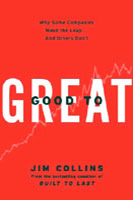 |
 Reading Group Guide for Good to Great: Why Some Companies Make the Leap... and Others Don't Buy Book |
About This BookCan good companies, mediocre companies, even bad companies achieve enduring greatness? And if so, what are the distinguishing characteristics that cause a company to go from good to great? Using tough benchmarks, Jim Collins and his research team embarked on a five-year pursuit to identify a set of elite companies that made the leap to great results. How great? These companies generated cumulative stock returns that beat the general stock market by an average of seven times in fifteen years, better than twice the results delivered by a composite index of the world's greatest companies, including Coca-Cola, Intel, General Electric, and Merck. The research team contrasted the good-to-great companies with a carefully selected set of comparison companies that failed to make the leap from good to great. Why did one set of companies become truly great performers while the other set remained only good? After sifting through mountains of data and thousands of pages of interviews, Collins and his team discovered the key determinants of greatness -- why some companies make the leap and others don't. The findings of the Good to Great study will surprise many readers and shed light on virtually every area of management study and practice. "Some of the key concepts discerned in the study," comments Jim Collins, "fly in the face of our modern business culture and will, quite frankly, upset some people." Perhaps, but who can afford to ignore these findings? Discussion Questions
Discussion questions provided courtesy of Harpercollins. |
|
All prices subject to change and given in U.S. Dollars. |
All materials contained in http://www.LeadershipNow.com are protected by copyright and trademark laws and may not be used for any purpose whatsoever other than private, non-commercial viewing purposes. Derivative works and other unauthorized copying or use of stills, video footage, text or graphics is expressly prohibited. LeadershipNow is a trademark of M2 Communications, LLC. |